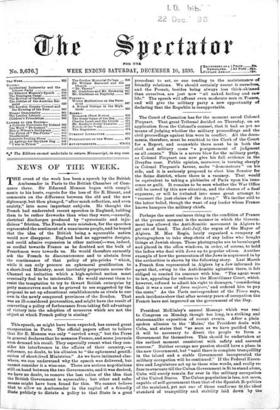This speech, as might have been expected, has caused great
exasperation in Paris. The official papers affect to believe that Sir E. Monson was only " carried away," but the Press in general declares that he menaces France, and some journals even demand his recall. They especially resent what they con- sider his interference in the afEa.irs of their country,—a reference, no doubt, to his allusion to " the ephemeral gratifi- cation of short-lived Ministries." As we have intimated else- where, we can understand why the speech was delivered, but cannot consider it a wise one. There are serious negotiations still on hand between the two Governments, and it was desired, we have no doubt, to remove the last relics of the idea that the British Government is squeezable ; but other and safer means might have been found for this. We cannot believe that to allow an Ambassador in the capital of a friendly State publicly to dictate a policy to that State is a good
precedent to set, or one tending to the maintenance of friendly relations. We should certainly resent it ourselves, and the French, besides being always less thick-skinned than ourselves, are just now " all naked feeling and raw life." The speech will affront even moderate men in France, and will give the military party a new opportunity of declaring that the Republic is insupportable.










































